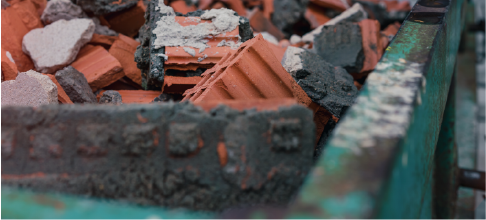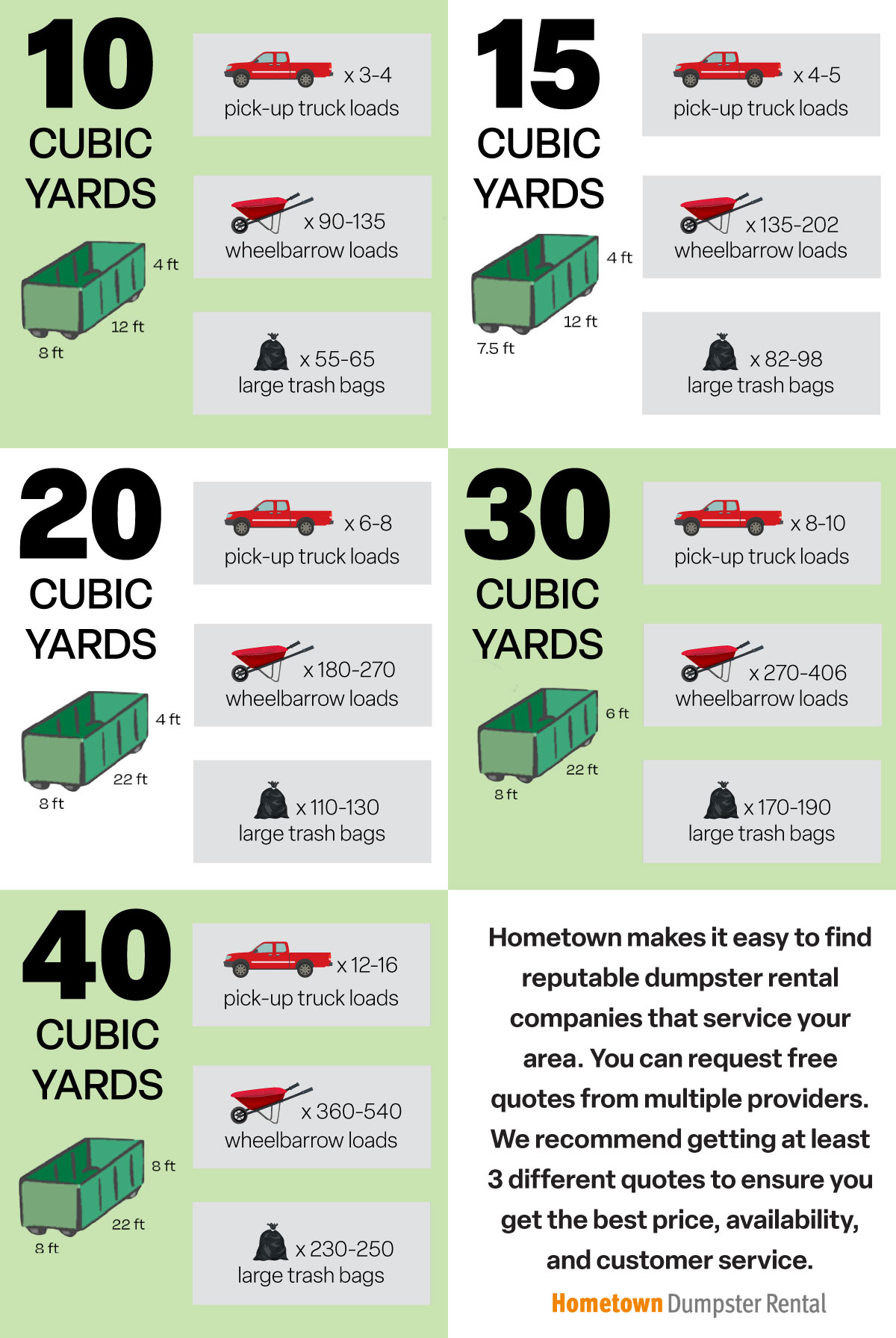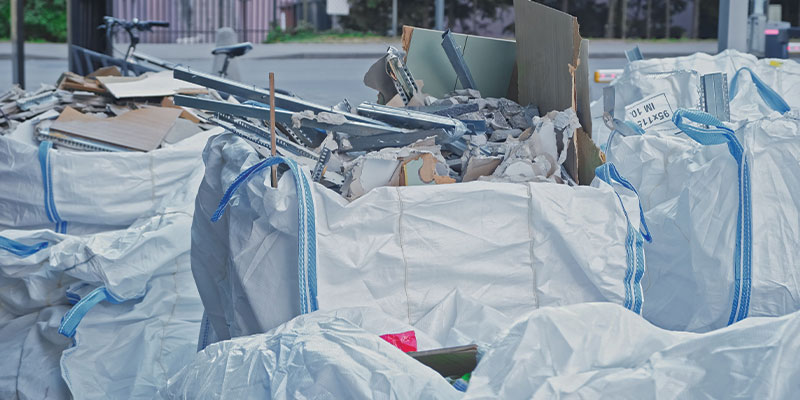
Updated January 10, 2024
Dumpster rentals come in a variety of sizes, and each size is measured in cubic yards.
Knowing how to estimate your junk or debris in cubic yards will make it easy for you to choose the right dumpster size for your project.
A cubic yard measures 1 yard L x 1 yard W x 1 yard H.
1 yard is 3 feet, so 1 cubic yard is 27 cubic feet.
To get a better idea of exactly how much junk or debris fits into a cubic yard and the most popular dumpster sizes, we’ll take a closer look at typical dumpster dimensions and loading capacities so that you can make the best choice for your project.
Jump to:
Find dumpster rentals near me
How to Measure the Volume of Waste
Measure the Area
Getting a rough estimate of the volume of garbage or debris you have to get rid of is actually a fairly straight-forward task.
Start by measuring the length, width, and height of your waste pile in feet. Convert inches into feet by diving the number of inches by 12.
If your pile is too large to comfortable use a tape measure, consider using a measuring wheel instead.
Estimate Volume
Once you have these dimensions, multiple them all together (LxWxH).
Because 1 cubic yard equals 27 feet, you'll then take your total (LxWxH) and divide it by 27.
- Convert inches to feet: 12 inches ÷ 12 = 1 foot
- Multiply LxWxH: 9 x 3 x 1 = 27
- Divid answer y 27: 27 ÷ 27 = 1 cubic yard
Cubic yardage can also easily be calculated by converting all three of your measured dimensions (of your pile of waste) into yards and multiplying them together.
There is 3 feet in 1 yard, so take each measurement (length, width, and height) and divide it by 3 to convert your measurements to yards.
We'll take the sample measurements used above to explain:
- If your length is 9 ft: 9 ÷ 3 = 3 yards
- If your width is 3 ft: 3 ÷ 3 = 3 yards
- If your height is 1 ft: 1 ÷ 3 = 1/3 yard
- Take all 3 covered measurements and multiply them for your cubic yardage: 3 x 3 x 1/3 = 1 cubic yard
Dumpster Loading Capacities
Now that you have an estimate of your waste's cubic yardage, choose a dumpster size that best suites your disposal needs.
| Dumpster Size | Average Dimensions (LxWxH) | Pick-Up Truck Loads | Wheelbarrow Loads | 33-Gallon Trash Bags | Average Weight Limit |
| 10 Yard Dumpster | 12x8x4 ft | 3-4 | 90-135 | 55-65 | 2-3 tons |
| 15 Yard Dumpster | 15x8x4 ft | 4-5 | 135-202 | 82-98 | 2-4 tons |
| 20 Yard Dumpster | 22x8x4 ft | 6-8 | 180-270 | 110-130 | 3-5 tons |
| 30 Yard Dumpster | 22x8x6 ft | 8-10 | 270-405 | 170-190 | 4-6 tons |
| 40 Yard Dumpster | 22x8x8 ft | 12-16 | 360-540 | 230-250 | 6-8 tons |

Learn more:
- How Many Dumpsters Do I Need?
- Dumpster Rental for Events and Festivals: Managing Waste Responsibly
- Dumpster Rental Dos and Don'ts: Tips for a Hassle-Free Experience
Average Weight of Different Waste
As we mentioned earlier, the weight of your debris will play a factor in the size of the dumpster you'll need.
Every dumpster has a weight limit to keep the rental company's employees, equipment, and customers safe.
For example, 10 cubic yards of concrete could not be safely placed in a 10 yard dumpster the way that 10 cubic yards of general household trash could. Because concrete weighs significantly more than other types of trash, you would need multiple 10 yard dumpsters to safely haul away that amount of heavy waste, like concrete.
View the table below to get an idea of how much these common dumpster items weigh with a volume of just 1 cubic yard.
| 1 Cubic Yard of Material | Average Weight |
| Asphalt and Concrete | 4,000 lbs |
| Bricks | 3,400 lbs |
| Carpet | 2,300-3,200 lbs |
| Drywall | 500 lbs |
| Gravel or Rock | 3,000 lbs |
| Household Debris | 150-300 lbs |
| Leaves and Brush | 400-500 lbs |
| Mulch | 600-1,000 lbs |
| Sand | 2,700 lbs |
| Scrap Metal | 1,000 lbs |
| Scrap Wood | 300 lbs |
| Shingles (Asphalt) | 2,500 lbs |
| Shingles (Slate) | 9,500 lbs |
| Soil | 2,000 lbs |
The good news is, if this all sounds confusing to you, a reputable dumpster provider will be able to help guide you in the right direction.
Speaking with multiple companies and getting several dumpster rental quotes is easily the best way to get an idea of exactly which size dumpster you'll need and what a fair price is for dumpster rentals in your area.
Hometown makes it fast and simple to get free quotes from locally-owned dumpster rental companies in your area. Our single quote request form makes it easy to fill out a few short answers about your project and location and have local service providers reach back out with their pricing and availability.
Never be afraid to ask the dumpster companies questions if you're unsure of any part of the process, and be sure to thoroughly go over the rental terms and agreement to ensure you aren't stuck with any added fees on your final bill.
Get free dumpster rental quotes near me
Continue reading:


